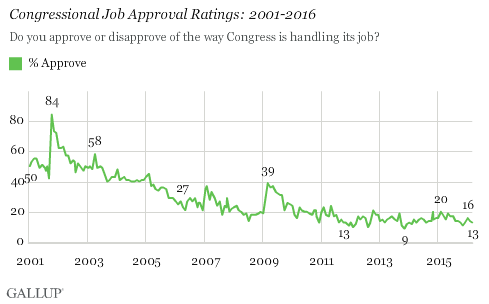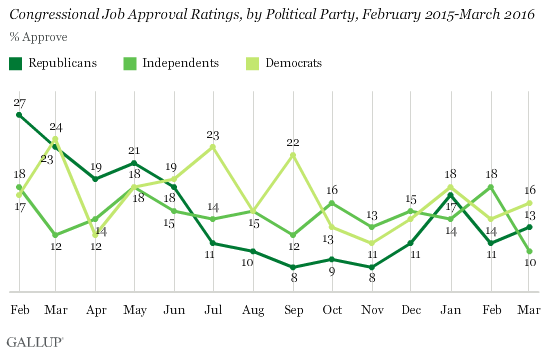In the U.S., 13% approve of the job Congress is doing, in line with approval ratings ranging from 11% to 16% since August. The current rating is just four percentage points above the record low of 9% recorded in November 2013.

Approval of Congress has not generally been high, averaging 32% since Gallup began measuring it in 1974. Americans' views of the country's legislative body reached a high of 84% after the 9/11 rally that saw record highs on many Gallup measures of confidence in government, but generally waned over the course of President George W. Bush's administration. Though congressional approval received a temporary boost at the beginning of President Barack Obama's administration, it plummeted and hit a record low of 9% in November 2013 in the aftermath of the federal government shutdown.
Congressional approval has reached 20% or higher only three times since 2012: in February of last year, shortly after Republicans took control of the Senate; at the time of the 2014 midterm elections; and just before the 2012 presidential election.
As has been the case in recent months, Americans of all political stripes give Congress similarly low approval ratings. Currently, 16% of Democrats, 13% of Republicans and 10% of independents approve. This state of affairs, in which Republicans' approval of Congress is no higher than that of Democrats, is contrary to the historical norm. Typically, supporters of the party holding the majority in Congress give the institution significantly more positive ratings than do supporters of the minority party.

Republicans in the latter half of 2015 gave Congress some of its lowest approval scores in Gallup's records as then-House Speaker John Boehner struggled to accommodate rival factions of his Republican majority. GOP approval ratings might have been lower during this time because Republicans had taken the Senate in the prior election, but had not accomplished the goals of their rank-and-file on issues such as immigration and Planned Parenthood funding.
Bottom Line
Americans have generally rated Congress poorly over the past four decades. Ratings since Obama took office have been and continue to be well below the overall average and near historical lows. Any gains in approval in recent years have been minor and short-lived, even after changes in party control of one or both houses of Congress in 2007, 2011 and 2015.
Congress is in a unique spotlight this election season, as a select few of its own members or former members vie for the White House, while the remaining members are left to choose between the establishment and anti-establishment candidates within their respective parties -- or to decide whether to publicly support a candidate at all. An election's outcome has ramifications for Congress, including possible changes in party control of each chamber and which presidential candidate party leaders will have to work with for the next four years.

No comments:
Post a Comment